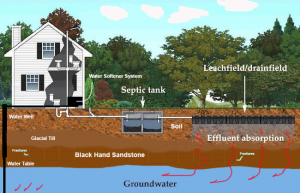
Are you thinking about septic system pros and cons? As a home or property owner, you probably want the best for your investments. One of the most important parts of owning a home or property is to make sure that the plumbing is up to date, cost-effective and running smoothly. That’s where septic systems come in. While this type of plumbing isn’t for everyone, it could be just what your property needs. In this article we will go over the pros and cons of having a septic tank.
Advantages of septic systems
 Easier on the environment
Easier on the environment
Regular sewer lines can sometimes leak raw sewage into the ground, contaminating our ground water. Since a septic system doesn’t flow through a sewer system, there is a significantly less chance of a leak. It also uses a natural filtration system that in turn minimizes your amount of pollution.
 Economical
Economical
Having a septic system can save you a lot of money. It is a more cost-effective way of plumbing, instead of installing new pipes and wasting water. Your septic tank will all but eliminate your public water bills, which will reduce your plumbing costs in the long run.
 Lower maintenance
Lower maintenance
Since your typical septic tank will only need pumping every three to five years, you will save on plumbing maintenance bills. Having regular cleaning and inspections between pumps will also help reduce your overall cost for having a septic tank.
 Long life expectancy
Long life expectancy
The general lifespan of a septic tank is between 20-40 years. It all depends on the material used for your tank and how well you take care of it. If you keep up with the maintenance, you will have a very happy and functional septic tank.
Easier to fix
Since septic tanks have their own filtration systems, you won’t have to bank on the finicky city sewer systems. If you have a plumbing issue, it is much easier to diagnose and correct on-site with the help of a septic plumbing company.
Disadvantages of septic systems
Everything in life will have a list of pros and cons, so why should septic tanks be any different? Below is a list of disadvantages that come with having a septic tank:
 Antibiotics
Antibiotics
When you have a sewer system, you don’t have to consider something so small as what medications you take. However, since the ecosystem in a septic tank is perfectly balanced in a delicate way, the smallest traces of antibiotics expelled in the household waste can drastically upset the tanks natural bacteria that helps to break down the solids and sludge.
 Tree roots
Tree roots
Another thing you must consider when it comes to septic tanks, is tree roots. Roots are attracted to the nutrient-rich effluent that is in your septic tank. If the roots can find even the smallest opening, for example a small crack in a concrete tank, they will force their way in so they can start soaking up all the vitamins and minerals that they need. This could lead to backflow into your home, the contents of the septic tank leaking out into the ground, causing a pooling above the tank itself, not to mention the smell.
 Water tables
Water tables
When you have a septic system, your drain field disperses the effluent from the tank and the sun helps to dry out the field and keep it ready for more effluent. If your water table is too high, your drain field can’t absorb the effluent because it is already full of water. This could also lead to backups into your home.
 Disposal
Disposal
Since the septic tank is just that, a tank, you must be careful and conscientious of what you put into your system. for example, some common things that can clog up a tank are tampons, sanitary wipes, too much toilet paper, larger amounts of food run through the garbage disposal. Also, certain types of cleaner, like bleach, will kill the bacteria in your septic tank, damaging the inner-ecosystem.
 Mound systems
Mound systems
Although not as common, mound septic systems are one of the least desirable systems to have. They are exactly that, a mound, a very visible eyesore on your property. Since a septic system doesn’t have a tank, instead of digging down, you must dig outwards so it has places to disperse the wastewater, which makes space another issue with this system. Another problem with mound systems is that they are far more obvious not only visually, but by sense of smell. If the wastewater from your house does not leach fast enough through your ground, it can work its way up to the surface, leaving you with that delightful sewage scent.
Conclusion
When it comes to your household plumbing, choosing the best option is what we are trained for. Our experts will take all your variables into consideration, so you don’t have to worry about anything other than keeping your family happy. Contact us today, so we can make you happy and confident with your plumbing decisions.
